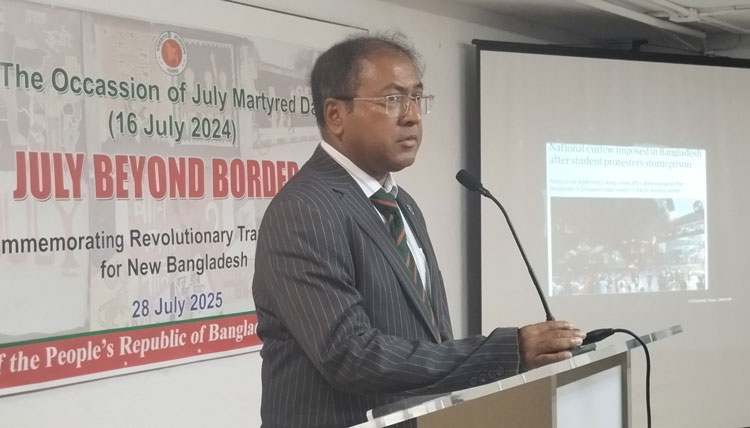Text and photos: Juan David Latorre.
Bangladeshi Ambassador Masudur Rahman commemorated last Saturday the demonstrations that took place a year ago by thousands of Bangladeshi university students in the country’s major cities and towns, protesting the Quota Law, which reformed government job quotas, leaving 200 dead and thousands injured.
The Bangladeshi Supreme Court announced the suspension of this law when the protests began to overwhelm the government, despite the fierce repression unleashed by Sheik Hasina with a dictatorial military deployment.
Over the weekend, the government’s announcement of a state of siege was accompanied by telecommunications blackouts, digital censorship, and the closure of hundreds of journalists’ accounts in the country. Along with this, a wave of arbitrary arrests and clandestine interrogations against student activists and militants was carried out. The dictatorial government was ousted, and a new internal government was formed, led by the renowned Professor Muhammad Yunus.
The Bangladeshi ambassador recalled those events that “took place in every city of Bangladesh, in every village of Bangladesh, in every corner of Bangladesh. History will remember this day how a new Bangladesh emerged and a new Bangladesh grew.”
“And a new Bangladesh grew,” Masudur Rahman noted. “Its vast majority, who truly loved democracy, who will love and always will love democracy, freedom, justice, non-discrimination, the liberation of all the stars of life, and the right to vote, the right to choose their people and also to be a citizen. These are the main human qualities that led Bangladesh to grow under the leadership of its students.”
“The Bangladeshi government,” he emphasized, “is also working on three policies that are the essence of Bangladesh today. The first is comprehensive reform in all sectors, from the legal system, the executive system, the judiciary, the Election Commission, tax reform, and the Public Service Commission. All of this will create an environment conducive to people’s lives. The democratization process has begun under a very courageous and kind model. The reform of the judicial system is intended to judge the autocratic and dictatorial government that ruled Bangladesh for 16 years in a brutal manner, resulting in the deaths of thousands of people.”
The commemorative event was attended by the ambassadors of Thailand and Iran, along with representatives of other delegations, including India, among others.
